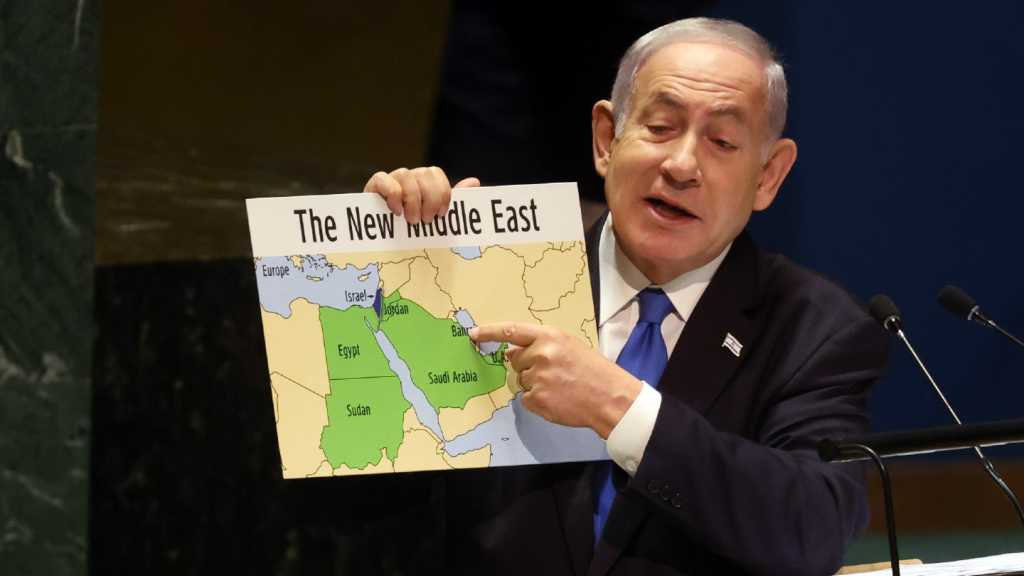The Illusion of Peace: Unmasking the ’Israeli’ Ambitions for Expansion

By Mohamad Hammoud
The notion of "Greater Israel" has long lingered in the shadows of political discourse, often dismissed as a fringe idea held by extremist elements. However, recent developments in the Middle East have reignited discussions about the expansionist ambitions of the "Israeli" state. The events of October 2024, marked by escalated military actions and controversial statements from key "Israeli" leaders, reveal a troubling trajectory toward empire-building that echoes the historical aspirations of Zionist ideology, as highlighted in the Haaretz article “Is 'Israel' Really Building an Empire Across the Middle East?"
The Roots of Expansionism
The idea of an expansive "Greater Israel" encompasses territories beyond the modern state's borders, deeply rooted in biblical claims and nationalist sentiments. This concept is derived from various biblical texts, including promises made to the patriarch Abraham, which many Zionists interpret as a divine right to the land stretching from the Nile River in Egypt to the Euphrates River in Iraq. This vision was further articulated in the early 20th century by Zionist leaders such as Theodor Herzl, who emphasized the necessity of a sovereign “Jewish state” that would encompass all of historical Palestine.
While many mainstream Zionists have moderated their claims since the 20th century—focusing on the boundaries established during the British Mandate—recent political shifts in "Israel" have emboldened radical factions advocating for territorial expansion.
The "Israeli" government's historical claims to land, particularly in Gaza and the West Bank, have provided a framework for justifying aggressive military actions and settlement policies that many view as precursors to annexation.
According to the Haaretz analysis, "Israeli" political leaders have increasingly employed rhetoric suggesting an intention to consolidate control over neighboring areas. This includes recent statements made by officials at a far-right conference endorsing the expulsion of Palestinians from Gaza under the guise of "voluntary emigration." Such calls for population transfers cloak a more insidious agenda: the systematic consolidation of "Israeli" control over contested territories.
The Catalyst of October 2024
The situation escalated dramatically in October 2024 when the "Israeli" Occupation Forces [IOF] embarked on an extensive military operation in the Syrian Golan Heights, coupled with settler movements into Gaza and Lebanon. This marked a significant departure from previous military engagements, signaling a profound intention to establish control over neighboring territories. The rhetoric surrounding these actions increasingly suggested a systematic plan to reshape the region in a manner reminiscent of historical imperial conquests.
As noted in the Haaretz article, the “Israeli” army’s aggressions in Lebanon and Syria have been framed as necessary security measures against groups like Hezbollah. However, the underlying motives appear to extend beyond mere “defense”. Support for military actions from various factions within the "Israeli" government illustrates a troubling alignment between political rhetoric and military objectives. The “Israeli” army’s admission of the presence of settler groups, such as "Wake up the North," in Lebanon signals a growing normalization of settlement expansion across borders.
Notably, a group called “Uri Tzafon”, advocating for "Israeli" settlement in southern Lebanon, briefly crossed the border to set up tents before being removed by the "Israeli" military. Their explicit intentions to establish a permanent presence in southern Lebanon reveal an unsettling trend toward territorial claims that extend well beyond the established borders of "Israel."
The Reality of Military Engagements
The military operations in Lebanon, Gaza, and the Golan Heights further underscore this ambition. Following a series of provocations with Hezbollah, the “Israeli” army’s full-scale invasion aimed to eliminate perceived threats and assert dominance over Lebanon, a territory historically viewed as part of the "promised land." Additionally, the “Israeli” army’s actions in the Golan Heights, where "Israeli" leadership has expressed intentions to remain indefinitely, reflect a significant shift in policy that echoes long-standing ambitions for territorial expansion.
The Haaretz article emphasizes that these military actions serve to make previous expansions into areas like Gaza appear less shocking. With the backdrop of mass expulsions and destruction in northern territories, the narrative surrounding annexation in the West Bank has faded from public consciousness. Recent declarations, such as those by Bezalel Smotrich, who announced nearly 6,000 acres of West Bank land to be designated as "state land," highlight the ongoing trend of settlement expansion aligning with the broader objectives of a Greater "Israel."
Historical precedents also reveal a continuous thread of expansionist ambitions. The 1967 Six-Day War resulted in "Israel" capturing the West Bank, Gaza Strip, and Golan Heights—territories many "Israelis" still view as integral to their “national” identity.
Furthermore, various "Israeli" political parties, including the Likud party, have historically advocated for policies that support settlement expansion in these areas, reinforcing the idea that "Israel" harbors dreams of expanding its borders.
Conclusion
The trajectory of "Israel" toward an empire-building agenda, especially illuminated by the events of October 2024, poses significant challenges not only for regional stability but also for the future of "Israeli" democracy. The Haaretz article serves as a crucial reminder of the dangers of unchecked ambition in a region fraught with historical grievances and complex political realities. The challenge lies in finding a path that reconciles security and sovereignty with justice and equality for all peoples in the region. Without such a reckoning, the dream of peaceful coexistence may remain an elusive aspiration, overshadowed by the specter of empire-building
Comments



